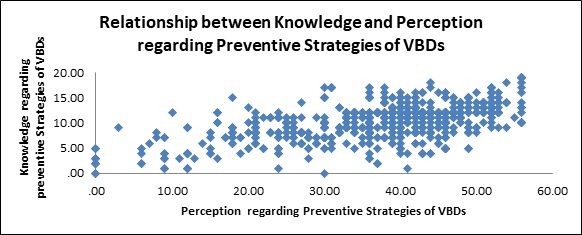A cross-sectional study on knowledge and perception about preventive strategies of selected vector-borne diseases among the rural population of coastal Karnataka
Abstract
Background and Objectives: Malaria and other vector-borne diseases (Dengue, Chikungunya and Filariasis) are a major public health problem in WHO’s South-East Asia Region. Due to the growing resistance to pesticides and drugs, there is a need to set up integrated vector management strategies. These strategies should involve local communities in managing the environment to decrease the health risks and increase the sustainability of programmes to control these vector-borne diseases. Hence, an important step in disease management is educating the local community regarding vector-borne diseases and their prevention.
Objectives: To assess the Knowledge & perception regarding preventive strategies of selected vector-borne diseases among the study population.
Methods: This study was conducted in two selected villages. A cross-sectional study design was used with a sample size of 966. A questionnaire method was used to collect the data.
Results: Around 46.5% of them had good knowledge regarding preventive strategies of vector-borne diseases. Whereas, Around 42.2% and 40% of the population had average perception and high perception respectively.
Conclusion: Even though only half of the population had good knowledge regarding preventive strategies for vector-borne diseases. Most of them had average to high perceptions about preventive strategies. Hence to increase their knowledge many camps and health education activities should be conducted on vector-borne diseases and should mainly emphasize community participation to increase their awareness. So that it leads to better practice which in turn will lead to a decrease in vector-borne diseases.
Downloads
References
WHO. World Health Day 2014: vector-borne diseases [Internet]. WHO. [cited 2015 Sep 25]. Available from: http://www.who.int/campaigns/world-health-day/2014/en/
Van Den Berg, H., Von Hildebrand, A., Ragunathan, V., & Das, P. K. Reducing vector-borne disease by empowering farmers in integrated vector management. Bulletin of the World Health Organization, 85 (2007): 561-566.
WHO. WHO_DCO_WHD_2014.1_eng.pdf [Internet]. [cited 2015 Aug 24]. Available from: http://apps.who.int/iris/bitstream/10665/111008/1/WHO_DCO_WHD_2014.1_eng.pdf?ua=1
Christophides, George K., and Andrea Crisanti. "Vector and vector-borne disease research: need for coherence, vision and strategic planning." (2013): 385-386.
Johansson MA, Apfeldorf KM, Dobson S, Devita J, Buczak AL, Baugher B. ett al. An open challenge to advance probabilistic forecasting for dengue epidemics. Proc Natl Acad Sci U S A. 2019 Nov 26;116(48):24268-24274. doi: 10.1073/pnas.1909865116.
Vector-borne diseases [Internet]. [cited 2021 Aug 2]. Available from: https://www.who.int/news-room/fact-sheets/detail/vector-borne-diseases
Census of India Website : Office of the Registrar General & Census Commissioner, India [Internet]. [cited 2015 Oct 29]. Available from: http://censusindia.gov.in/
Joshi AB, Banjara MR. Malaria related knowledge, practices and behaviour of people in Nepal. J Vector Borne Dis. 2008 Mar;45(1):44-50.
Anand T, Kumar R, Saini V, Meena G, Ingle G. Knowledge and use of personal protective measures against mosquito borne diseases in a resettlement colony of delhi. Ann Med Health Sci Res. 2014 Mar;4(2):227-32. doi: 10.4103/2141-9248.129048.
Doke PP, Dakhure DS, Patil AV. A clinico-epidemiological study of Chikungunya outbreak in Maharashtra State, India. Indian J Public Health. 2011 Oct-Dec;55(4):313-6. doi: 10.4103/0019-557X.92413.
Unnikrishnan, B., Anan Jaiswal, and B. Reshmi. "Awareness and treatment seeking behaviour of people affected with Malaria in Coastal South India." Iranian Journal of Public Health 37.1 (2008): 119-123.
Pérez-Guerra CL, Zielinski-Gutierrez E, Vargas-Torres D, Clark GG. Community beliefs and practices about dengue in Puerto Rico. Rev Panam Salud Publica. 2009 Mar;25(3):218-26. doi: 10.1590/s1020-49892009000300005.
Patel, A. B., Rathod, H., Shah, P., Patel, V., Garsondiya, J., & Sharma, R. Perceptions regarding mosquito borne diseases in an urban area of Rajkot city. Natl J Med Res, 1.2 (2011): 45-7.
Sharma AK, Bhasin S, Chaturvedi S. Predictors of knowledge about malaria in India. J Vector Borne Dis. 2007 Sep;44(3):189-97.
Ahmed, S. M., Haque, R., Haque, U., & Hossain, A. Knowledge on the transmission, prevention and treatment of malaria among two endemic populations of Bangladesh and their health-seeking behaviour. Malaria journal 8.1 (2009): 1-11.
Dhimal M, Aryal KK, Dhimal ML, Gautam I, Singh SP, Bhusal CL. et al. Knowledge, attitude and practice regarding dengue fever among the healthy population of highland and lowland communities in central Nepal. PLoS One. 2014 Jul 9;9(7):e102028. doi: 10.1371/journal.pone.0102028.
Liu X, Wan F, Cirendunzhu, Cirenwangla, Bai L, Pengcuociren. et al. Community knowledge and experience of mosquitoes and personal prevention and control practices in Lhasa, Tibet. Int J Environ Res Public Health. 2014 Sep 23;11(9):9919-37. doi: 10.3390/ijerph110909919.

Copyright (c) 2021 Author (s). Published by Siddharth Health Research and Social Welfare Society

This work is licensed under a Creative Commons Attribution 4.0 International License.


 OAI - Open Archives Initiative
OAI - Open Archives Initiative


